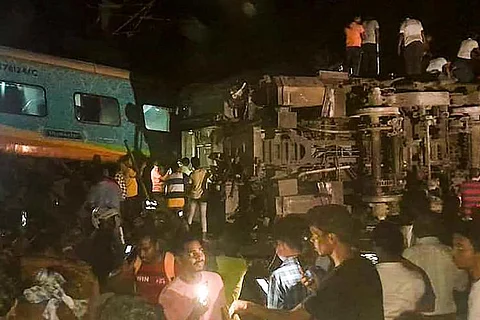

Two days after the Odisha triple train tragedy led to 275 deaths, the Railways Ministry briefed the media about the circumstances of the accident. Railway Board Member (Operations and Business Development) Jaya Varma Sinha shared information claimed to be first-hand accounts of the accident she had gathered from the loco pilot of the Shalimar-Chennai Coromandel Express and a TTE (train ticket examiner) of the Bengaluru-Howrah Superfast Express, the two passenger trains involved in the accident.
Speaking to the media on Sunday, June 4, Sinha said that the loco pilot of Coromandel Express, who is in a critical condition, informed the Railway Board minutes after the accident that the signal on the main line of the tracks at the Bahanaga Bazar station was green. Explaining the interlocking system in railway signalling and the track layout at the Bahanaga Bazar station, the Railway Board officials said that the station had four tracks — two main lines (up line and down line) for trains passing straight through the station without stopping, and two loop lines diverging from these main lines for halting vehicles.
The interlocking signal turns green to indicate that a train can move straight ahead on a main line, and turns yellow to indicate that it is it to take the diverging loop line, they said. The Bengaluru-Howrah and Shalimar-Chennai trains were to take the main lines in opposite directions, and both loop lines had goods trains that had halted on them.
According to the information shared by the Railway Board members, on June 2, around 6.55 pm, the Chennai-bound Coromandel Express was passing through the Bahanaga Bazar station in Odisha’s Balasore district when it collided with a goods train halted on the loop line. “When this accident happened, I received the information within 15 minutes. We gathered in the disaster war room and spoke to the driver of Coromandel Express, who was in a conscious state then. He said the signal was green, we only spoke that much,” Sinha told reporters. The loco pilot is currently in hospital in a critical condition. While the maximum speed limit on the main lines was 130 kmph, Coromandel Express was going at 128 kmph and the Bengaluru-Howrah one at 126 kmph, within permissible limits, Sinha said.
The Coromandel Express moving at full speed collided with a stationary goods train containing iron ore, which rejected the collision impact, and the entire impact was felt by the passenger train alone and the engine and coaches piled up, Sinha said. “The train had LHB coaches which are relatively safe and don’t usually overturn. This case was an exception because of the high speed, the jumping of coaches couldn’t have been prevented by any technology,” she said.
The guard of the iron ore-carrying goods train survived as he was performing his duty of inspecting the train when it was halted, Sinha said. “At the time of the accident, the guard was checking the train. His train’s brake van was crushed, but he survived because he had gotten down,” she said. She stressed that the main lines through which the Bengaluru-Howrah and Shalimar-Chennai trains were to take in opposite directions had their direction and signals were set and that the signal was green.
Authorities are yet to reveal the exact reason for the initial collision between the Coromandel Express and the stationary iron ore-carrying goods train. Meanwhile, the coaches of Coromandel Express scattered on the adjacent down main line. And while the Bengaluru-Howrah Express had almost passed by at the time, “for a fraction of a second.'' Its last two coaches were obstructed by Coromandel Express’s derailed coaches, and with the impact, they also got derailed and were flung away, Sinha said, adding that the other stationary goods train on the down loop line was mildly affected by this.
“I spoke to a TTE of the Bengaluru-Howrah Express. He told me he heard a loud abnormal noise from behind, and when he looked, he felt an obstruction was approaching but couldn't tell what it was. Behind the A1 coach of this train, there were two general compartments and the guard’s coach in the end. These coaches got detached from the train. While the rest of the train including the A1 coach went ahead safely, the last two coaches got hit.” Sinha said.
The Railway Board said that prime facie, those responsible for the accident have been identified, and the details would be revealed once the Commission of Railway Safety submits its probe report.